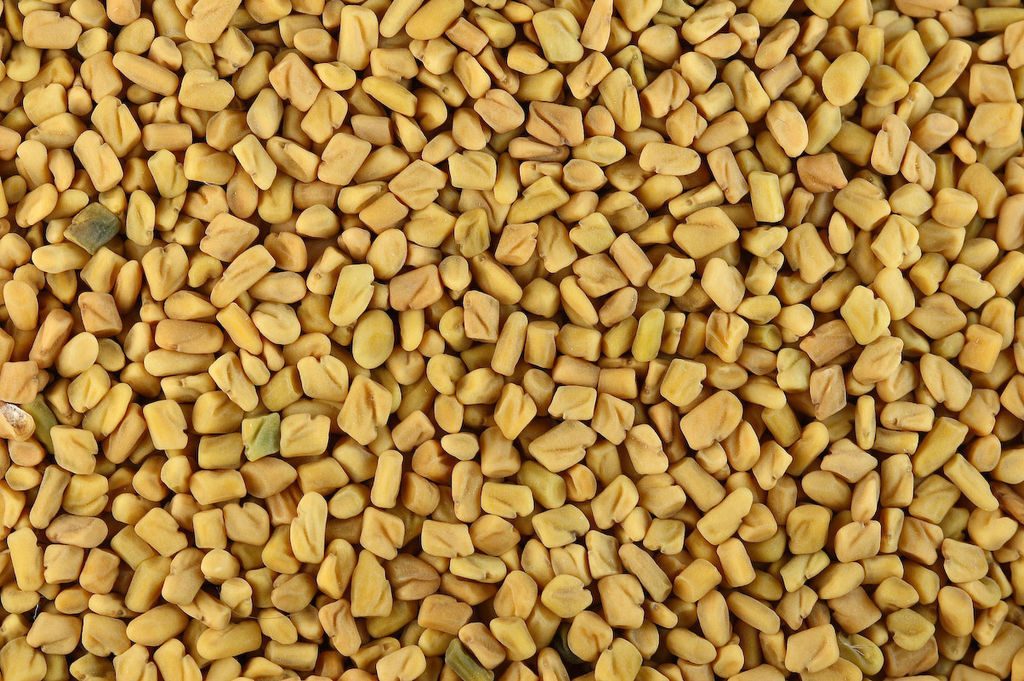Fenugreek is one of the most reliable, research-backed herbal remedies for lowering blood sugar.

Fenugreek is a herb whose seeds and leaves have medicinal properties. Fenugreek has been suggested to help control blood sugar by:
- Reducing glucose absorption. Fenugreek slows the digestion and absorption of dietary carbohydrates.
- Supporting insulin. Fenugreek promotes the activity of insulin, the key hormone keeping your blood sugar in a healthy range.
Overview
Fenugreek (Trigonella foenum-graecum) is a medicinal herb with a long history of use. Originating in the Near East, fenugreek seeds and leaves have been utilized in Ancient Egyptian, Greek, Roman, and even Chinese and Ayurvedic medicine. Its main traditional uses are inducing childbirth, improving digestion, and supporting overall health as a tonic.
Today, fenugreek supplements are popular for improving diabetes, digestion, and libido, and increasing milk supply. In fact, fenugreek has consistently been shown to lower blood sugar levels in diabetics, making it one of the most reliable antidiabetic supplements.
In addition to this, fenugreek is an increasingly popular ingredient in testosterone and growth hormone booster formulas meant to improve exercise performance and male health.

How Fenugreek Might Help With Blood Sugar
Fenugreek can help control blood sugar in two main ways:
Reducing glucose absorption
Fenugreek contains active ingredients such as fiber that slow the digestion and absorption of carbohydrates in the digestive tract. 1 This results in less sugar going into the blood after eating food, thereby helping regulate blood sugar levels.
Supporting insulin
Fenugreek appears to stimulate the activity of insulin, the main hormone responsible for keeping blood sugar levels within a healthy range. For example, one study found that the amino acid derivative compound 4-hydroxyisoleucine from fenugreek stimulated the release of insulin in pancreas cells, while another noted that fenugreek interacts with the insulin receptor. 2 3
Fenugreek Uses & Benefits for Blood Sugar
People frequently take fenugreek supplements to lower their blood sugar levels, either by itself or as an addition to other medications and supplements.
Clinical research supports the use of fenugreek for lowering blood sugar levels in diabetics. Indeed, the latest review of the highest-quality human trials of fenugreek for blood sugar control concluded that “Results from clinical trials support beneficial effects of fenugreek seeds on glycemic control in persons with diabetes.” 4
Furthermore, research highlights additional benefits such as reduction of insulin resistance and improvement of insulin sensitivity – which contribute to better blood sugar control.
Read more: Blood Sugar Supplements Guide

Research
Human Research
Human studies of fenugreek preparations show consistent reduction of blood sugar levels in type 2 diabetics, as well as reduced insulin resistance and and an overall improvement of blood sugar control.
This frequently-cited randomized, double-blind, placebo-controlled study evaluated the effects of fenugreek on blood sugar and insulin resistance in diabetes. A total of 25 type 2 diabetics were given placebo or fenugreek seed extract (1 g) daily for two months. Compared to placebo, the fenugreek group experienced a reduction in blood glucose and insulin levels, as well as improvement of insulin resistance and blood triglyceride and HDL (“good”) cholesterol levels.
- The researchers concluded that “Adjunct use of fenugreek seeds improves glycemic control and decreases insulin resistance in mild type-2 diabetic patients.” 5
Fenugreek extract appears to reduce blood sugar in diabetics
This randomized, placebo-controlled study looked at the benefits of adding fenugreek extract to sulfonylureas (SU), a common hypoglycemic drug. A total of 69 type 2 diabetics who had difficulty controlling blood sugar with SU only were given placebo or fenugreek total saponin (TFG) extract daily for 12 weeks. Compared to placebo, the fenugreek group experienced a reduction in fasting and postprandial (postmeal) blood glucose, HbA1c (a measure of average glucose levels over several months), and other health benefits.
- The researchers concluded that “combined therapy of TFGs with sulfonylureas hypoglycemic drug could lower the blood glucose level and ameliorate clinical symptoms in the treatment of T2DM…” 6
Fenugreek seeds (100 g) appear to reduce fasting blood sugar in diabetics
This randomized study evaluated the blood sugar benefits of fenugreek. Fifteen diabetics followed a diet with or without 100 g of defatted fenugreek seed powder (added in two doses at lunch and dinner) for 10 days. Addition of fenugreek significantly reduced fasting blood sugar levels and improved results on the glucose tolerance test.
- The researchers concluded that “These results indicate the usefulness of fenugreek seeds in the management of diabetes.” 7
Fenugreek powder (5 g) appears to reduce blood sugar in diabetics
This placebo-controlled study examined the effects of ginger and fenugreek on blood sugar and cholesterol. Fenugreek powder (5 g) or placebo was given to both healthy individuals and those with type 2 diabetes (NIDDM) daily for 3 months. Although there was no benefit in healthy adults, diabetics taking fenugreek experienced a reduction in both fasting and postmeal blood sugar.
- The researchers concluded that “When administered in the same daily dose to NIDDM (non-CAD) patients (mild cases), fenugreek reduced significantly the blood sugar…” 8
Fenugreek seed extract (1.2 g) may improve insulin sensitivity in overweight individuals
This randomized, double-blind, placebo-controlled study examined the benefits of fenugreek in overweight people. A total of 39 overweight men were given fenugreek seed extract (1.2 g) or placebo daily for 6 weeks. The fenugreek group experienced a reduction in insulin/glucose ratio, an indicator of improved insulin sensitivity.
- The researchers concluded that “We also observed a significant decrease in the insulin/glucose ratio…” 9
Fenugreek seed powder (10 g) may reduce fasting blood sugar levels
This study evaluated the blood sugar effects of fenugreek seed in diabetics. A total of 24 type 2 diabetics were given fenugreek seed powder (10 g) daily for 8 weeks, mixed with yogurt or soaked in hot water. Taking the powder with water significantly reduced fasting blood sugar and blood lipid (fat) levels.
- The researchers concluded that “…fenugreek seeds can be used as an adjuvant in the control of type 2 diabetes mellitus…” 10
Dosage for Blood Sugar
- Research studies use different forms of fenugreek, making it difficult to recommend a dosage
- Supplements typically provide 0.9-1.5 g fenugreek seed powder dosages
- Multi-ingredient blood sugar supplements contain smaller fenugreek dosages (40-400 mg)
- The general dosage suggested for blood sugar is 1-2 g fenugreek capsules, or 2+ g as seeds
Available Forms
- Fenugreek seed powder. Powdered fenugreek seed sold in capsules is the most common form used in supplements. This seems to be the ideal form for blood sugar control.
- Fenugreek seed extract. An extract standardized to contain a certain amount of active ingredients, usually saponins.
- Fenugreek seeds or leaves. Unprocessed fenugreek seeds or dried/fresh leaves have many uses such as spice, tea, and flour to make bread.
- FenuLife®. This is a patented fenugreek extract standardized to contain 85% of the soluble fiber galactomannan.
Supplements in Review Recommendation
- Fenugreek seed powder or extract capsules, 1-2 g for blood sugar.
We recommend fenugreek for lowering blood sugar. A large number of clinical studies report improved blood sugar control and levels in diabetics taking fenugreek products.
Fenugreek seed capsules (1-2 g) is the most convenient dosage. Although there isn’t enough research to recommend a particular dosage, 1-2 g of fenugreek seed powder or extract seems to be effective.
Leave a Reply